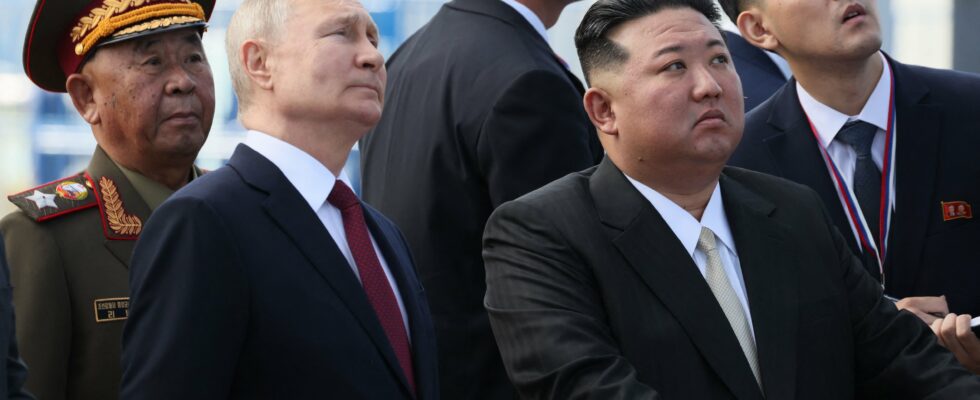The misfortune of one person makes the happiness of others. Thanks to the war in Ukraine, Kim Jong-un has expanded the circle of his dictator friends: he is preparing to welcome Vladimir Putin with fanfare in the coming weeks. The “hermit kingdom” is in turmoil: the visit of the Russian president, the first since July 2000, is highly symbolic for a pariah country that the Covid-19 epidemic had further isolated on the international scene. And which had become very dependent on support from China, its largest trading partner.
Kim and Putin, who met in Russia in September 2023, appear to be experiencing a real bromance. Brought together by their hatred of the United States, the two autocrats increased their exchanges of good practices. Thus, in March, at the UN Security Council, Moscow vetoed the extension of the commission of experts responsible for ensuring compliance with the sanctions imposed on North Korea (due to the development of its nuclear program ). Pyongyang will therefore be able to continue to sell ballistic missiles and shells to Russia – millions so far, according to some estimates –, decisive help against Ukraine. The Russian vote also leaves a little more free hands for the “supreme leader” to develop his missiles and his nuclear arsenal, but also to relaunch his trafficking of all kinds.
A nuclear submarine capable of launching missiles
The two neighbors have stood together since the start of the Russian offensive in Ukraine. The heir to the communist dynasty has approved all of the Kremlin’s annexations, and misses no opportunity to show his “solidarity”. In April, he even sent 150 workers to reconstruction sites in the Ukrainian provinces invaded by Moscow. In exchange, Putin supplies oil to Pyongyang. It would also share its technological know-how, according to American intelligence. The success, in November, of putting the “spy” satellite Malligyong-1 into orbit, would have been facilitated by a Russian helping hand, negotiated two months earlier at the Vostochny cosmodrome, in the Russian Far East, between the head of Kremlin and the North Korean “Great Sun of the 21st Century”. Still according to Washington, Moscow would also help Pyongyang develop a nuclear-powered submarine capable of launching missiles, Kim’s great ambition.
The interest in rapprochement is also economic for North Korea, which has emerged bloodless from the health crisis. Travel by Russian tourists has restarted, as has rail traffic between the Russian city of Vladivostok and Rason, a logistics center in North Korea’s northeast. As a result, “thanks to its activity based on supplying shells to Russia, North Korea is doing better and better,” notes Cheong Seong-chang of the Sejong Institute in Seoul. Also benefiting from the resumption of its trade with China, it is more easily supplied with food products, raw materials and everyday consumer goods.
In reality, the “friendship” between Russians and North Koreans has ancient roots. Liberated in 1945 from Japanese rule, the Korean peninsula was divided in two, with the North falling under the control of a communist regime set up by Stalin and led by Kim Jong-un’s grandfather. Although the links were able to loosen, they never broke. The 75th anniversary of the bilateral cooperation treaty was celebrated with great fanfare in March in Pyongyang. The Mariinsky Theater troupe gave two ballets there, in the presence of the Russian Deputy Minister of Culture.
Obsessed with the stability of its environment, Beijing does not appreciate seeing North Korea develop its nuclear capabilities and be aggressive, but supports it when it comes to castigating Washington. China, which remained neutral during the UN vote on the commission of experts, said in March it was “gravely concerned” by the joint military exercises organized between the United States and South Korea. And, recently, in Moscow, Chinese President Xi Jinping joined Vladimir Putin to denounce the “military intimidation” of the United States against Pyongyang. “Due to the strengthening of ties between these three countries, it has become almost impossible to dissuade North Korea from continuing its nuclear development,” laments the South Korean daily Tea Korea Times.
.
